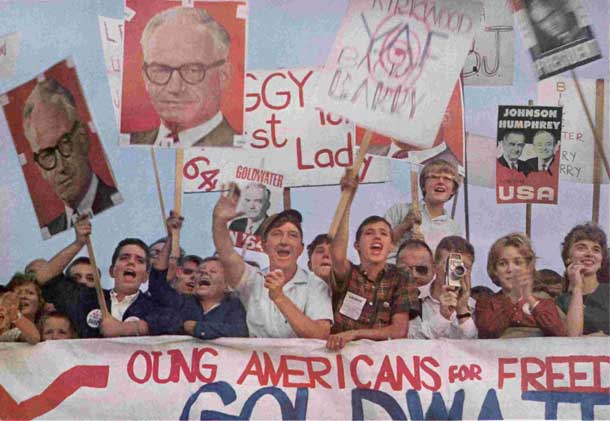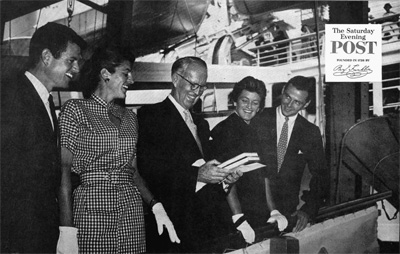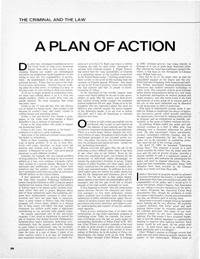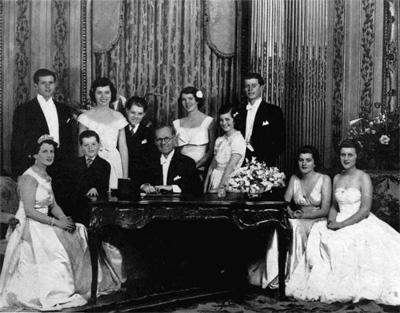The Civil Rights Act vs. States’ Rights

Photo credit: Burt Glinn
The Saturday Evening Post, October 24, 1964.
No one was surprised when President Kennedy’s Civil Rights bill was blocked by a group of 19 senators in 1964. On March 30, they launched a filibuster to prevent a vote on the bill, knowing that if it passed, it would seriously challenge the racial status quo in their states.
As described in a Post editorial, the bill would ensure black Americans’ voting rights, end discrimination in public accommodation, and empower the U.S. Attorney General to bring lawsuits to desegregate public schools. It would also let the federal government cut off assistance to state and local programs that practiced discrimination.
One of the bill’s most vocal opponents was South Carolina’s Strom Thurmond, who called the bill “unconstitutional, unnecessary, unwise…beyond the realm of reason.” A Georgia senator added, “We will resist to the bitter end any measure or any movement which would have a tendency to bring about social equality.”
But after 54 days of filibustering, the bill’s supporters had gathered enough votes to end the filibuster. On June 10, the bill was voted on and passed, 73 to 27. President Johnson signed it into law on July 2, fifty years ago to date.
Arizona’s Barry Goldwater was among the 27 senators who had voted against the civil rights bill, but he wasn’t discouraged by the defeat, because he planned to use the bill’s passage to help him win the presidency in the fall election.
Goldwater recognized that the Civil Rights Act would split the liberal and conservative wings of the Democratic Party. For years, the Democrats had been able to hold these two warring factions together, but as the liberal wing began supporting the growing civil rights movement, many white, conservative Democrats began withdrawing their support of the party their families had supported for generations.
The day would come, Goldwater predicted in a 1963 Post article, “The G.O.P. Invades the South,” when the region would vote solidly Republican. He noted that Republican candidates were already winning elections in Florida, North Carolina, and Georgia. The South would shift its party allegiance, he said, because of “a profound evolution of political thinking and acting.”
It had nothing to do, he asserted, with white voters being angry with liberal Democrats’ support of integration. Southerners were leaving the party, he said, because they believed in “state’s rights,” and limiting the role of the federal government. They viewed the Civil Rights Act as an intrusion that, Goldwater argued, would eventually lead to “the creation of a police state.”
Civil rights were important, Goldwater believed, but they were “resolved more safely and soundly on the state or local level.”
But the local level, as Anthony Lewis wrote, was precisely where the problem lay. (“Goldwater Is Wrong On Civil Right” September 26, 1964) The law in southern states and towns was vigorously enforcing racist policies, using intimidation and violence to deprive African Americans of their rights.
The U.S. Government had tried Goldwater’s approach for nearly a century, Lewis argued. When states were left on their own to handle race relations, “the result was massive inequality, injustice, and cruelty that shocked the conscience of this nation…The law has been cynically manipulated to maintain white supremacy, in defiance of the most elementary rights of a citizen.”
Federal intervention was necessary, he said, to prevent state officials from enforcing racist politics, as in the illustrations he offered:
• When a Mississippi college student asked a country registrar’s help to enroll black voters, the registrar refused, threatened him with a gun, and then, as the student was leaving, clubbed him over the head. The student was then arrested, jailed, and charged with disturbing the peace.
• Twelve black residents in Louisiana asked city officials to form a committee to address race relations in the community. All twelve were arrested on charges of intimidating public officials. Their bail was set at $30,000.
• When a young civil rights worker was arrested in a Georgia town, she called her father, who drove down from Kansas to bail his daughter out of jail. As they were leaving town, a police car pulled them over. The father was arrested, frisked, handcuffed, and put in county jail for “driving a car with a bad muffler.”
• Fifty-seven black Mississippians asked their local deputy sheriff to protect them from harassment during their voter registration campaign. The sheriff arrested them and charged them with disturbing the peace. After a night in jail, 46 of them were tried and sentenced to six months in jail and fined $35,000.
• Over 300 Freedom Riders, both black and white, were arrested in Jackson, MS, for attempting to break local laws that segregated bus terminals. Charged with “breach of peace,” they were unable to get the charges dismissed until they took their case to the Supreme Court
By emphasizing states’ rights and dismissing the problems of civil rights, Lewis wrote, Goldwater encouraged racist politicians like Governor Wallace of Alabama to defy federal law, acts which contributed to the atmosphere of violence in the South.
“There have been so many horrors in the last year,” Lewis wrote, “that one’s senses have become numbed: four little girls killed in the bombing of a Birmingham church; Medgar Evers of the N.A.A.C.P. shot outside his Jackson, Miss., home; a negro army officer murdered as he drove along a Georgia road; three civil rights workers murdered in Mississippi; and 15 negro churches in that state burned within a month.”
While Goldwater was looking forward to a solidly Republican South, a Post editorial was foreseeing an angry black community. Within the decade, the editors wrote, most of America’s largest cities would have populations that were mostly African American. Unless they were “given hope and some sense of citizenship and self respect, this huge majority is dead sure to be led by people who hate the guts of every white man.”
Goldwater lost the 1964 election by the largest margin in 144 years. He won only 38.5 percent of the popular vote and carried just five states in addition to Arizona. All five were in the south.
Edward Moore Kennedy: 1932-2009
When Edward M. Kennedy won Massachusetts’ senatorial race in 1962, one of his brothers was the U.S. Attorney General and the other was president. At the time, his opponents discounted Edward’s success, claiming he only won because of family connections. The Post, which would never be accused of supporting Edward Kennedy, was unusually snide about his first senate victory.
“Well, Teddy won the Democratic nomination for the Senate, and we suppose that is all that matters in many minds. The voters of Massachusetts, to paraphrase a close relative of Teddy’s, have made their judgment, and who can question the wisdom of the Democratic voters? Let us now close ranks, rally round the flag, remember Pearl Harbor and accept the verdict of the highest judge. As far as we are concerned, the voters of Massachusetts made a mistake. They picked a charming, handsome, golden-voice youngster with a name—a man who is unqualified for such an exalted office.”
It was the beginning of a steady stream of criticism leveled at Edward Kennedy over the years. He was belittled for his family connections, his good looks, his privileged upbringing, and, of course, for several occasions of bad judgment as an adult.

Such things could be forgiven. Other senators had done worse and outlived the scandal.
What was unforgivable to Kennedy’s opponents was his unflinching fidelity to liberal causes. He never toyed with conservatism, or waffled to attract uncommitted voters. The people of Massachusetts knew where he stood and returned him to Washington nine times, personal traits and all.
He was an idealist, but he was also an adept politician. During his tenure, he authored more than 300 bills that passed the Senate—a feat he couldn’t have accomplished without gaining the support of many of his opponents. Nor did he choose popular legislation. Senator Kennedy promoted campaign-finance reform and AIDS research. He opposed illegal interventions in Central America and apartheid in South Africa. He backed The Americans with Disabilities Act of 1990, the Civil Rights Act of 1991, and the COBRA plan to extend health insurance to the unemployed.
In 1967 he wrote an article for the Post, detailing his ideas for reducing crime. It is a good illustration of his thoughts on public policy.

“Consider, for example, the very special problem of drug addiction. For far too long we have treated addicts as if they were ordinary criminals, rather than victims of a serious disease. … Following California’s pioneer program initiated in 1961, Congress passed legislation last session which would permit addicts in federal cases to be placed under medical treatment rather than sent to prison. Because about half of those committed under the California program have subsequently returned to their communities and have not gone back to narcotics, there is good reason to believe that this federal program will return many addicts to a normal life.
“An equally significant part of any anti-crime program, I feel, must be legislation to control the sale of firearms. Our Senate Juvenile Delinquency Subcommittee heard testimony indicating overwhelmingly that the present mail-order business in guns makes it ridiculously easy for juveniles, criminals, even lunatics to obtain firearms for less than the price of a pair of shoes. I know of no other country where it is as easy for dangerous and misguided members of society to obtain firearms as it is in the U.S. Each year about a million weapons are sold by mail order, thousands to persons with criminal records. J. Edgar Hoover has stated that the ‘easy accessibility of firearms is a significant factor in the murders committed in the United States today.’ Nothing could testify more vividly to the truth of this warning than the example of Charles Joseph Whitman, who stood on top of the Texas University tower one horrible day last summer and shot 15 people to death, wounding 31 others. [At the time Senator Kennedy wrote this, only one of his brothers had been shot to death.]

“If we are seriously concerned about crime, we must acknowledge our responsibility to do something about the crumbling slum schools and poor housing, and the shocking unemployment rates for the young Negroes, Puerto Ricans and Mexican Americans. Indeed, with crime most prevalent among young people, every community must focus special attention on its youth, particularly the disadvantaged. Today’s delinquents will be tomorrow’s criminals—unless the community, through education, job training and treatment programs, prepares these youngsters for the productive tasks of adulthood. Most of us who share in the good life of our rich nation are law-abiding citizens. The promise of America is that someday all may share. In our work to fulfill that promise lies one of our most effective weapons against crime.”
If Senator Kennedy reread this 1967 article last week, he would find nothing to rewrite or regret. He remained unapologetically, unwaveringly liberal through the years. Even when it wasn’t convenient or politically correct, he stayed committed to an idea of humanitarian democracy.
Download “A Plan of Action” (PDF) by Sen. Edward Kennedy, 1967.